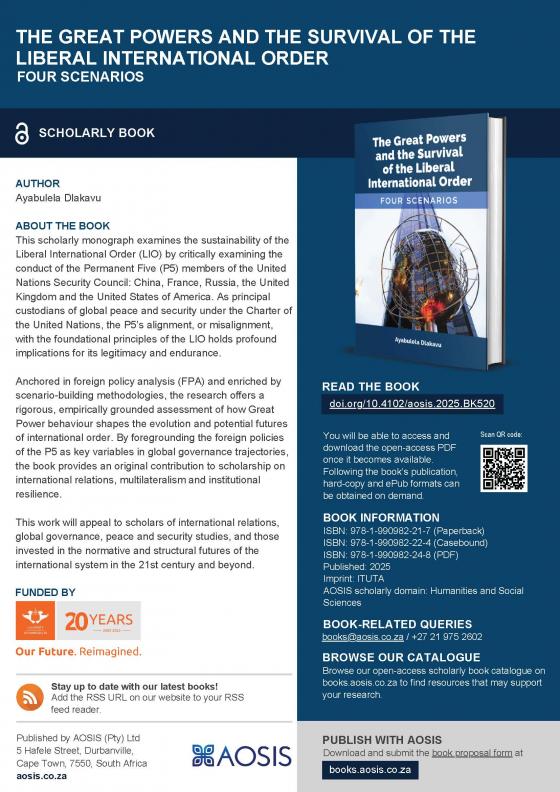The Great Powers and the Survival of the Liberal International Order: Four scenarios
Dr Ayabulela Dlakavu talks to us about his new book, The Great Powers and the Survival of the Liberal International Order: Four scenarios
- Why did you write this book?
The book The Great Powers and the Survival of the Liberal International Order: Four scenarios is inspired my PhD thesis. However, it is quite a larger volume of work (about 6 more chapters, with greater scope for Middle Eastern and other developments in the post-2021 era). Credit to the Vice-Dean of Internationalisation, Professor Bhaso Ndzendze (UJ), and the Special Advisor to the Minister of International Relations and Cooperation, Professor Chris Landsberg (UJ), who have been steadfast in making sure I actually produce this book. At a personal level, I believe the reinvigoration of Political Science and International Relations must be in their collective capacities to map scenarios of systems, organisations and events so as to place individuals, organisations, and businesses on the front foot regarding opportunities and risks in the dynamic global political economy we inhabit.
- Discuss a few key themes and its significance?
The main theme in this book is international order - that is, international organisations, rules and norms founded by nation-states to facilitate international cooperation on matters of common interest: defense, security, social and economic development, and stability. The book is ultimately concerned with the sustainability/future of the dominant international order of our time since 1945: which is constituted by United States leadership, key diplomatic institutions such as the United Nations and its various organs, and global economic institutions (chiefly, World Bank, International Monetary Fund, World Trade Organisation). The book also previews emerging mechanisms that are possible future orders at an international scale. The book first takes a historic view at pre-1945 international orders, particularly the factors motivating for the establishment of such orders, how they were maintained and what were the sources of cracks and eventual dissolution of such orders.

The monograph then evaluates the sustainability of the current Liberal International Order (LIO) by critically examining the conduct of the founding Permanent Five (P5) members of the United Nations Security Council: China, France, Russia, the United Kingdom and the United States of America. As principal custodians of global peace and security under the Charter of the United Nations, the P5’s alignment, or misalignment, with the foundational principles of the LIO holds profound implications for its legitimacy and endurance.
- Why would this book be key to WSG students and stakeholders?
We are a School of Governance, possibly the leading School of Governance in Africa. Part of governance is actually looking at mechanisms of Global Governance, and the Liberal International Order remains the most consequential system that largely determines the success or failures of our governments. Think of tariffs, sanctions, war, peace: all these international relations matters are vested within the powers and privileges of the liberal order which is the main subject of this book. It is important for our governments and students to be well versed in matters of global governance because these mechanisms actually inform our public policy responses to the global environment we inhabit. Our governments in the Global South still seek development assistance (aid) and finance from this very order: none more vividly than the seeming haphazard destruction of USAID (not quite haphazard for scholars of international relations and political economy). Some of our students and scholars at the WSG focus on political risk analysis and management: there is no risk analysis without scanning the political, economic, social, technological, environment and legal (PESTEL) environment. The Liberal International Order happens to have driven ideology, and development policy prescriptions for the past 80 years, and continues to do so. Africa has been on the harsh side of some of this prescriptions, and at odd times - it has benefitted (i.e. a favourable free international trade regime whose future is unknown at this stage).
- In light of the changing global challenges – how is the timing relevant for this book
The book comes at a time where the world and our international system is at a crossroads: is it disintegrating in a less violent manner than its predecessors who have been destroyed through World and Regional Warfare? Are there emerging international orders that can replace it? Is BRICS+ a solid foundation for a possible alternative international order or is it too thin as an intergovernmental organisation? Are we going back to previous epochs of international isolation, where each country basically needs to fend for itself and prepare for all likely risks that come with it: invasions, subjugation and perpetual warfare? This book's evaluation proffers scenarios that governments should prepare for given their legal mandates to protect and defend their populations along with their national interests.
The book is open-access, freely downloadable through the following AOSIS link:




